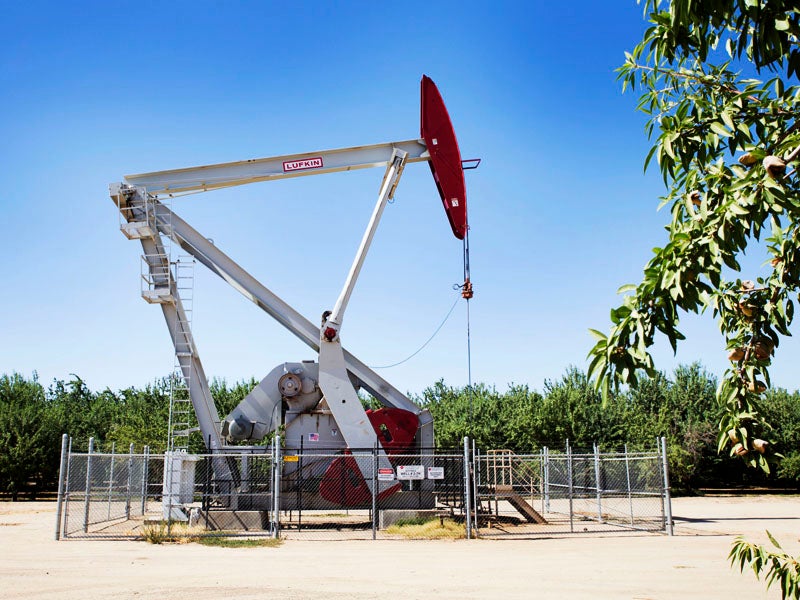California Produce Growing Strong on Oil Water
Due to water scarcity, more oil drilling companies are applying for permits to sell their wastewater to California’s farmers.

This page was published 10 years ago. Find the latest on Earthjustice’s work.
California’s Central Valley is a world entwined in contradiction. Lush rows of crops and orchards stretch as far as the eye can see while bone-dry, caramel-colored hills surround them. This farming mecca exported approximately $21.24 billion in agricultural products in 2013, but the valley’s largest cities hover in the top five U.S. regions hosting the highest percentages of people living in poverty. Agricultural wealth, much like its water during drought, hardly trickles.
In a region known for feeding America, the oil and gas industry is also booming. Seven of California’s 10 largest oil fields run beneath the valley. Because of California’s water scarcity, the interplay of these two industries is creating one more dangerous contradiction: the use of toxic drilling wastewater for agricultural irrigation.
According to a Los Angeles Times report, Chevron recycles 21 million gallons of oil field wastewater every day, selling it to farmers who use it to water 45,000 acres of citrus, nut and grape crops. This program has been in effect for 20 years, but the ongoing drought is inspiring more companies to apply for the permits they need to begin similar programs.
New permit holders can expect higher chemical-testing standards than those accepted in the past. Earlier this year, all oil producers received a notification from the Central Valley water authority requiring them to test for more chemicals in wastewater to comply with new state fracking regulations passed in December 2014. Until now, regulators didn’t require testing of wastewater for the range of chemicals used in modern oil production. This includes the process of hydraulic fracturing or “fracking,” a technique in which oil and gas are drilled from rock under a high-pressure mixture of water and chemicals.
The tests are in, and the findings are a little hard to swallow. Chevron’s recycled wastewater contains traces of oil, the carcinogenic chemical benzene, and acetone, a powerful industrial solvent. While California’s regulations do not allow even trace amounts of benzene in drinking water, there is no state standard for crop irrigation water. Another regulatory hole allows this water to be used on farms that are USDA certified organic, and a portion of those 45,000 acres irrigated with Chevron’s water belongs to Sunview, a company selling organic raisins and grapes.
In response to these findings, Assemblyman Mike Gatto (CA-D) introduced a bill that would require agriculture irrigated with water previously used in oil production to display the warning, “Produced using recycled or treated oil-field wastewater.” If passed, this law would give consumers the opportunity to make an informed decision about how their food is produced.
Earthjustice is working to block a federal plan to open up more than a million acres of public land and mineral rights in central California to oil drilling. We are also working to protect freshwater supplies by stopping the injection of industry wastewater into protected aquifers.